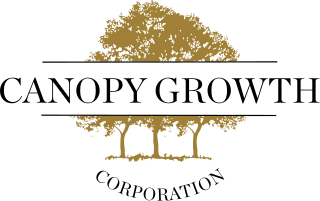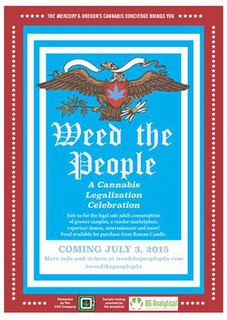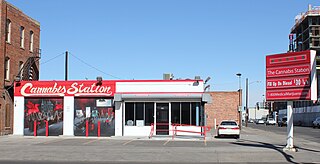 | |
| Author | Bruce Barcott |
|---|---|
| Publisher | Time Books |
| ISBN | 978-1-61893-140-5 |
| OCLC | 937667506 |
Weed the People: The Future of Legal Marijuana in America is a 2015 book written by Bruce Barcott and published by Time Books. [1] [2] [3] [4]
 | |
| Author | Bruce Barcott |
|---|---|
| Publisher | Time Books |
| ISBN | 978-1-61893-140-5 |
| OCLC | 937667506 |
Weed the People: The Future of Legal Marijuana in America is a 2015 book written by Bruce Barcott and published by Time Books. [1] [2] [3] [4]

The legality of cannabis for medical and recreational use varies by country, in terms of its possession, distribution, and cultivation, and how it can be consumed and what medical conditions it can be used for. These policies in most countries are regulated by three United Nations treaties: the 1961 Single Convention on Narcotic Drugs, the 1971 Convention on Psychotropic Substances, and the 1988 Convention Against Illicit Traffic in Narcotic Drugs and Psychotropic Substances. Cannabis is classified as a Schedule I drug under the Single Convention treaty, meaning that signatories can allow medical use but that it is considered to be an addictive drug with a serious risk of abuse.

Cannabis culture describes a social atmosphere or series of associated social behaviors that depends heavily upon cannabis consumption, particularly as an entheogen, recreational drug and medicine.
Bruce Barcott is an American editor, environmental journalist and author. He is a contributing editor of Outside and has written articles for The New York Times Magazine, National Geographic, Mother Jones, Sports Illustrated, Harper's Magazine, Legal Affairs, Utne Reader and others. He has also written a number of books, including The Measure of a Mountain: Beauty and Terror on Mount Rainier (1997) and The Last Flight of the Scarlet Macaw: One Woman's Fight to Save the World's Most Beautiful Bird (2008). In 2009 he was named a Guggenheim Fellow in nonfiction.

Marijuana, or marihuana, is a name for the cannabis plant and more specifically a drug preparation from it. "Marijuana" as a term varies in usage, definition and legal application around the world. Some jurisdictions define "marijuana" as the whole cannabis plant or any part of it, while others refer to "marijuana" as a portion of the cannabis plant that contains high levels of tetrahydrocannabinol (THC). Some jurisdictions recognize "marijuana" as a distinctive strain of cannabis, the other being hemp. For legal, research and statistical reference, "marijuana" generally refers to only the dried leaves and flowering tops, with by-products such as hashish or hash oil being uniquely defined and regulated. The form "marihuana" is first attested in Mexican Spanish; it then spread to other varieties of Spanish and to English, French, and other languages.

In the United States, the use and possession of cannabis is illegal under federal law for any purpose by way of the Controlled Substances Act of 1970 (CSA). Under the CSA, cannabis is classified as a Schedule I substance, determined to have a high potential for abuse and no accepted medical use – thereby prohibiting even medical use of the drug. Despite this, most states have legalized either or both the medical and recreational use of cannabis.

Charlotte's Web is a brand of high-cannabidiol (CBD), low-tetrahydrocannabinol (THC) products derived from industrial hemp and marketed as dietary supplements and cosmetics under federal law of the United States. It is produced by Charlotte's Web, Inc. in Colorado. Hemp-derived products do not induce the psychoactive "high" typically associated with recreational marijuana strains that are high in THC. Charlotte's Web hemp-derived products contain less than 0.3% THC.

Canopy Growth Corporation, formerly Tweed Marijuana Inc., is a cannabis company based in Smiths Falls, Ontario.

"Weed the People", officially "Weed the People: A Cannabis Legalization Celebration", was an event held in Portland on July 3, 2015, two days after recreational marijuana became legal in the U.S. state of Oregon. Sponsored by the Portland Mercury and two cannabis companies, the event was attended by an estimated 1,500–2,000 people, who were provided up to seven grams of marijuana for immediate consumption or to take home. Organizers complied with restrictions on recreational sales by distributing free cannabis and required attendees to pay an entry fee. More than 1,300 tickets were sold, but the building's 500-person capacity meant long wait times to enter. Media outlets reported on the historic nature of the event, which was described as a "stoner's paradise" and a celebration of freedom.
With the adoption of their historic citizen votes in the 2014 general election, marijuana tourism in the United States, a form of drug tourism, exists in Colorado and Washington state.

Cannabis dispensaries in the United States or marijuana dispensaries are a local government regulated physical location, typically inside a retail storefront or office building, in which a person can purchase cannabis and cannabis related items for medical or recreational use. First modeled in Amsterdam in the late 1970s where they were innocently called coffee shops, it would take the Americans more than a generation to successfully duplicate the idea of a retail cannabis storefront. Unlike in the Dutch coffee shops, today dispensary customers are prevented from consuming cannabis on the site of a regulated dispensary in all known markets.

Cannabis in Nevada became legal for recreational use on January 1, 2017, following the passage of Question 2 on the 2016 ballot. The first licensed sales of recreational cannabis began on July 1, 2017.

Cannabis in New Jersey is legal for both medical use and recreational use. An amendment to the state constitution legalizing cannabis became effective on January 1, 2021, and enabling legislation and related bills were signed into law by governor Phil Murphy on February 22, 2021.

Cannabis in Washington relates to a number of legislative, legal, and cultural events surrounding the use of cannabis. On December 6, 2012, Washington became the first U.S. state to legalize recreational use of marijuana and the first to allow recreational marijuana sales. The state had previously legalized medical marijuana in 1998. Under state law, cannabis is legal for medical purposes and for any purpose by adults over 21.
During the administration of American President George H. W. Bush (1989–1993), the United States largely followed the precedents set by the cannabis policy of the Reagan administration, including prosecution of the War on Drugs.

The Green Rush (2012–present) is an ongoing global economic event that began on December 6, 2012, when cannabis was legalized in the US state of Washington; Colorado's legalization took effect four days later. While still illegal federally in the United States, the actions of these two state governments signaled the opening of a market projected to be worth US$48+ billion globally by 2027. As of 2019 the cannabis industry had created over 250,000 jobs. However, cannabis companies have been a mixed investment success, with many experiencing plunging stock prices, massive layoffs, and failure to meet investor expectations.
The Cannabis Administration and Opportunity Act is a proposed bill in the United States Congress to recognize legalization of cannabis by the states. The authors are Senate Majority Leader Chuck Schumer, Senator Cory Booker, and Senator Ron Wyden.